The NVIDIA GeForce GTX 980 Ti Review
by Ryan Smith on May 31, 2015 6:00 PM ESTCompute
Shifting gears, we have our look at compute performance. Since GTX Titan X has no compute feature advantage - no fast double precision support like what's found in the Kepler generation Titans - the performance difference between the GTX Titan X and GTX 980 Ti should be very straightforward.
Starting us off for our look at compute is LuxMark3.0, the latest version of the official benchmark of LuxRender 2.0. LuxRender’s GPU-accelerated rendering mode is an OpenCL based ray tracer that forms a part of the larger LuxRender suite. Ray tracing has become a stronghold for GPUs in recent years as ray tracing maps well to GPU pipelines, allowing artists to render scenes much more quickly than with CPUs alone.
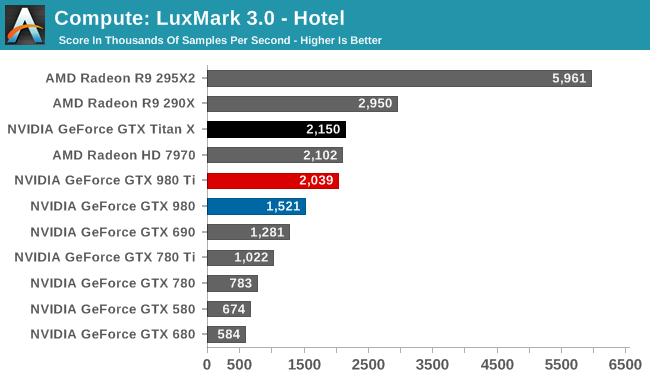
With the pace set for GM200 by GTX Titan X, there’s little to say here that hasn’t already been said. Maxwell does not fare well in LuxMark, and while GTX 980 Ti continues to stick very close to GTX Titan X, it none the less ends up right behind the Radeon HD 7970 in this benchmark.
For our second set of compute benchmarks we have CompuBench 1.5, the successor to CLBenchmark. CompuBench offers a wide array of different practical compute workloads, and we’ve decided to focus on face detection, optical flow modeling, and particle simulations.
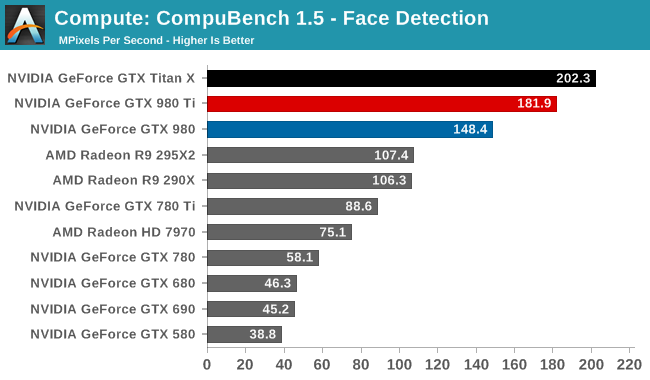
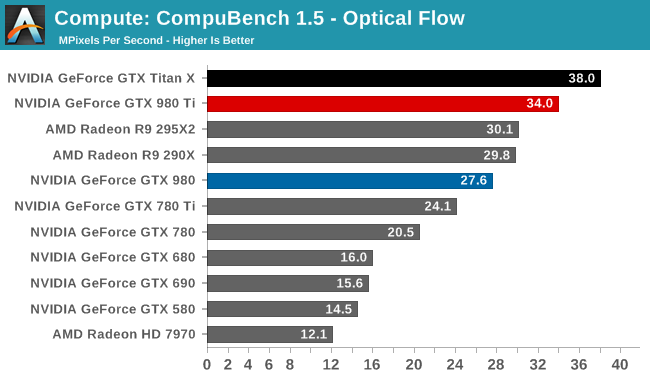
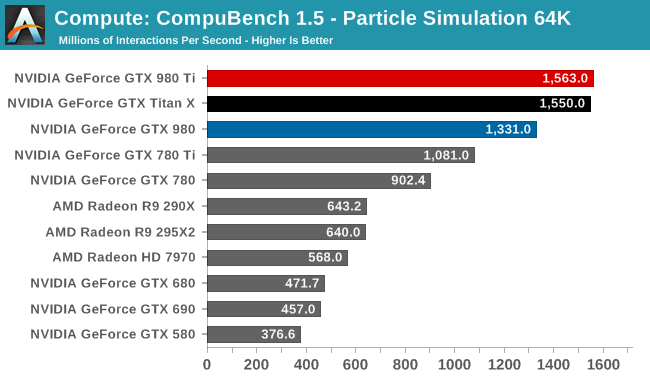
Although GTX T980 Ti struggled at LuxMark, the same cannot be said for CompuBench. Though taking the second spot in all 3 sub-tests - right behind GTX Titan X - there's a bit wider of a gap than normal between the two GM200 cards, causing GTX 980 Ti to trail a little more significantly than in other tests. Given the short nature of these tests, GTX 980 Ti doesn't get to enjoy its usual clockspeed advantage, making this one of the only benchmarks where the theoretical 9% performance difference between the cards becomes a reality.
Our 3rd compute benchmark is Sony Vegas Pro 13, an OpenGL and OpenCL video editing and authoring package. Vegas can use GPUs in a few different ways, the primary uses being to accelerate the video effects and compositing process itself, and in the video encoding step. With video encoding being increasingly offloaded to dedicated DSPs these days we’re focusing on the editing and compositing process, rendering to a low CPU overhead format (XDCAM EX). This specific test comes from Sony, and measures how long it takes to render a video.
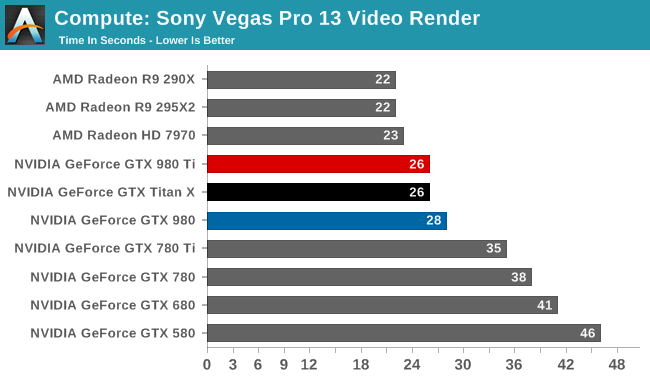
Traditionally a benchmark that favors AMD, GTX 980 Ti fares as well as GTX Titan X, closing the gap some. But it's still not enough to surpass Radeon HD 7970, let alone Radeon R9 290X.
Moving on, our 4th compute benchmark is FAHBench, the official Folding @ Home benchmark. Folding @ Home is the popular Stanford-backed research and distributed computing initiative that has work distributed to millions of volunteer computers over the internet, each of which is responsible for a tiny slice of a protein folding simulation. FAHBench can test both single precision and double precision floating point performance, with single precision being the most useful metric for most consumer cards due to their low double precision performance. Each precision has two modes, explicit and implicit, the difference being whether water atoms are included in the simulation, which adds quite a bit of work and overhead. This is another OpenCL test, utilizing the OpenCL path for FAHCore 17.
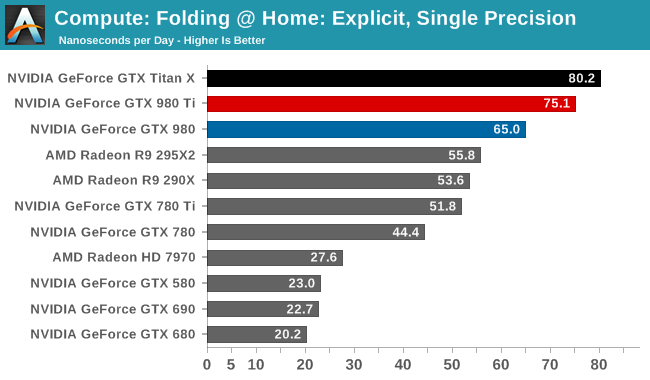
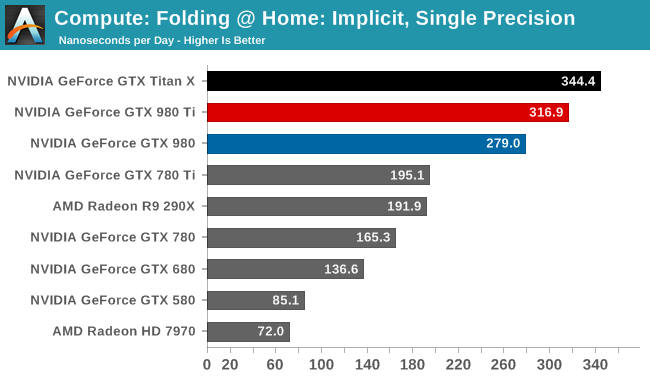
Folding @ Home’s single precision tests reiterate GM200's FP32 compute credentials. Second only to GTX Titan X, GTX 980 Ti fares very well here.
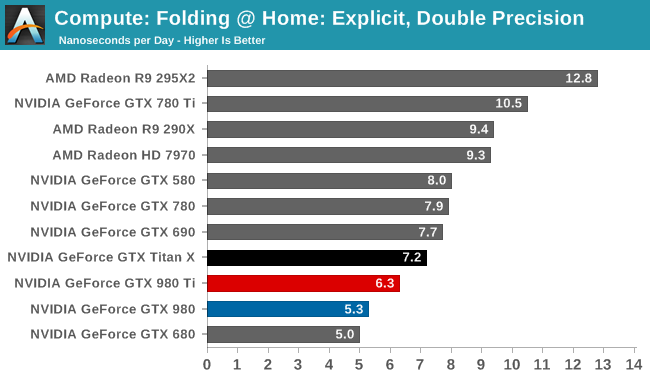
Meanwhile Folding @ Home’s double precision test reiterates GM200's poor FP64 compute performance. At 6.3ns/day, it, like the GTX Titan X, occupies the lower portion of our benchmark charts, below AMD's cards and NVIDIA's high-performnace FP64 cards.
Wrapping things up, our final compute benchmark is an in-house project developed by our very own Dr. Ian Cutress. SystemCompute is our first C++ AMP benchmark, utilizing Microsoft’s simple C++ extensions to allow the easy use of GPU computing in C++ programs. SystemCompute in turn is a collection of benchmarks for several different fundamental compute algorithms, with the final score represented in points. DirectCompute is the compute backend for C++ AMP on Windows, so this forms our other DirectCompute test.
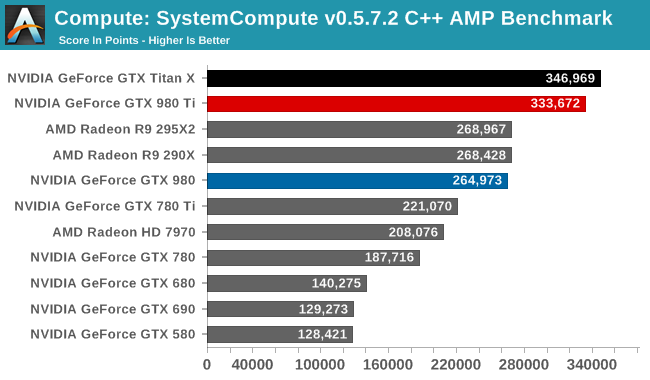
We end up ending our benchmarks where we started: with the GTX 980 Ti slightly trailing the GTX Titan X, and with the two GM200 cards taking the top two spots overall. So as with GTX Titan X, GTX 980 Ti is a force to be reckoned with for FP32 compute, which for a pure consumer card should be a good match for consumer compute workloads.










290 Comments
View All Comments
Daroller - Monday, June 1, 2015 - link
HAHAHAHAHA website lagged out and triple posted. That's awesome. Go go Google Chrome!naxeem - Monday, June 1, 2015 - link
I don't think it is all good with the overclocking part. On stock air (albeit 80% fan speed unless used Accelero IV at 40%) cooler TitanX cards easily get to 1300/1440 normal/boost clocks. Same cards on water got to 1375/1500 with cool-ish 55°C at max load. That applies to two TitanX in SLI with modified BIOS that allows for more power consumption and thus removes artificial limit.Since the chip is identical and 980Ti is actually partially defective TitanX with 50% less RAM and switched off defective parts, I highly doubt clock potential differs, especially not in favor of 980Ti.
I would and do expect 980Ti to clock the same as Titan X (loosing some on chip quality, gaining some on half the VRAM).
FlushedBubblyJock - Saturday, June 13, 2015 - link
Nope. Other test sites show the opposite - 980TI is an overclock monster and beats the TXtruongpham - Monday, June 1, 2015 - link
Ryan, can you bench this one with Windows 10 and DX12?Ryan Smith - Monday, June 1, 2015 - link
We won't be doing any complete Win10 benchmarking until that OS is finished and released. As for DX12, there are no games out yet that re using it; the handful of benchmarks are focused tech demos.cknobman - Monday, June 1, 2015 - link
Nvidia must have seen some undisclosed AMD benchmarks, went into panic mode, and rushed a release for the 980TI to get customers before the AMD launch.While its a great card the problem is Nvidia screwed some of their own customers.
I take this as a sign that whatever AMD is coming out with must be pretty good. :)
galta - Monday, June 1, 2015 - link
Maybe, but it could prove to be of little importance.You see, Win10 will be out on June 29th. Realistically speaking, DX12 games won't be real before Christmas or 2016.
It is more than enough time for a possible counterstrike from nVidia.
Having said that, unless one really really needs to upgrade now I would strongly recommend waiting for another month, just to check what Fiji is up to.
As of me, I have a pair of 980GTX Strix and have been with nVidia for a while, but I really hope AMD gets this one right.
Real competition is always good.
JayFiveAlive - Monday, June 1, 2015 - link
I've been waiting for this beast to drop... now to decide whether it's a good time to bite.Current setup is a 2500K OC to 4.4Ghz and a GTX 670, so kinda oldish... Was considering upgrading to a Skylake proc come Sept and this 980 Ti, but probably Gigabyte variant... hmmm.
Peichen - Tuesday, June 2, 2015 - link
Why upgrade CPU? 2500K at 4.4GHz is still very fast and shouldn't affect performance of a 980Ti much. Maybe 10% less fps vs if you have a 6-core Extreme but why spend $300-400 to get 10% improvement?mapesdhs - Wednesday, June 3, 2015 - link
Plus if he does need some more CPU oomph, just put in a 2700K. I've built six so far, every one of them happily runs at 5GHz with just a decent air cooler & one fan for quiet operation, though for final setups I use an H80 and two quiet fans. Some games will benefit from more than 4 cores, depends on the game (eg. PvP online FPS can involve a lot of host side scripting, eg. Project Reality, and the upcoming Squad).True though, 2500K is still very potent, just built a 4.8 setup for a friend. She lives on an island, it'll probably be the quickest system for miles around. :D